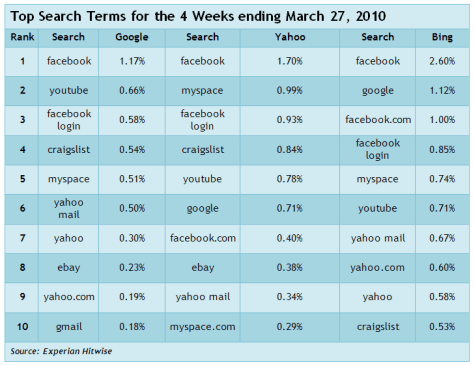Google is not a search engine – at least it’s not the way many people are using it. True, it can find you things – often unexpected and not always what you wanted. But, the latest information from Hitwise shows that most people are using Google merely as a “shorthand” way of getting to other websites they already know about.
The number one search phrase on Google (and Bing and Yahoo!) for the end of March was….wait for it…a single world. And that single word was….Facebook. Every day, more than a million people went to Google, typed in the word “Facebook” into the search box and then clicked on the first result to get to Facebook. They could have done that simply by typing the word Facebook into the address bar at the top of their browser, avoiding the second or two delay by going via Google – and the extra two clicks it takes.

If you look at the remaining Top 10 searches on Google in the month, you find they are all for websites that people could get to without going to Google, but simply by typing the name of the website into the address bar. Indeed, 273,000 people go to Google every day to “search” for…Yahoo! And the second most popular search on Microsoft’s Bing was the word…Google….! Other Top 10 search terms include YouTube, Ebay and Gmail. According to the Hitwise results, one in every 20 “searches” on Google is for a website that can be typed directly into the address bar, without ever needing to go to Google itself. Every day, 4.5m people are using Google when they don’t need to.
What it shows is that Google has become the “de facto” method of getting anywhere on the web. People type in a well known name, it is inevitably the Number One result which they then click on and get to where they want to be. It appears to be easy, but is actually marginally slower than going directly, via the address bar in the browser.
Of course, millions more searches are conducted with other search terms and phrases; but what is revealing is the way in which Google is being used. Rather than “searching” for things, the most popular use of Google is to reach stuff people already know about. As such it is being seen less as a “search engine” and more as a “convenience engine”. And the same is true for both Yahoo! and Bing, it seems from these results.
It confirms that what you need to do to achieve success with Google is concentrate less on SEO and more on being known. For instance, in the world of insurance comparison, the phrase “compare insurance” gets 450,000 monthly searches in the UK and the second most popular search phrase in that field with 246,000 monthly searches is “GoCompare”. In other words, almost a quarter of a million people must have heard the term “gocompare” in order to search for it – those dreadful TV adverts have a real impact. In the same way that people could arrive at any of the Top 10 searched for websites simply by typing in the name into the browser address bar, they could get to GoCompare.com doing that as well. Instead, they decide to go to Google, type the name into the search box and then click on the number one result.
This all suggests that if you spend all of your efforts in getting people to know your business name, if you concentrate on offline branding and associating words with your company, then people will use Google merely as a shorthand device to reach you. It is just further emphasis of the importance of offline branding and public relations. The more people know about your company offline, the more they will type in the right words in a search engine to reach you via the inevitable Number One result.
If you remember that the principal use of Google is NOT as a search engine, but as a shorthand device to reach things already known about, that could change your attitude and thinking as to where you should spend those precious marketing pounds and dollars. All of the world’s most successful online companies spend most of their marketing budget in offline activities. These latest figures from Hitwise confirm those dollars were spent wisely.
This doesn’t mean that SEO is completely unnecessary; it just should put it into perspective. Priority should be given to creating your offline presence so that people use Google in the way it is mostly being used – as a convenience engine, not a search engine. SEO helps, of course, but only for those people who don’t already know about you. Concentrate on getting people to know about you and search takes a secondary importance.
